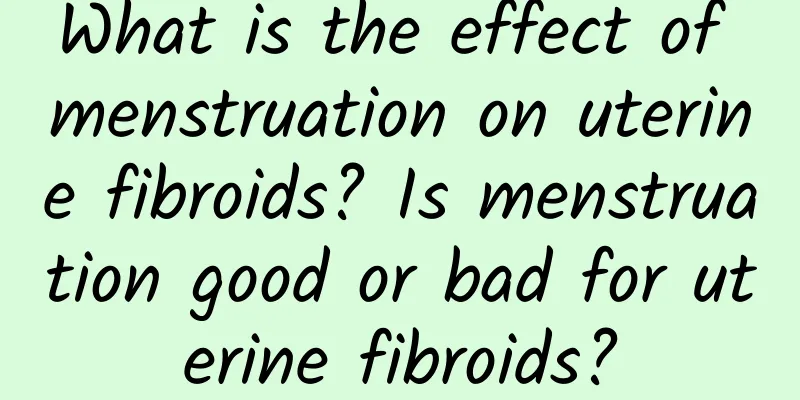What is the effect of menstruation on uterine fibroids? Is menstruation good or bad for uterine fibroids?

|
What effect does menstruation have on uterine fibroids? Is menstruation good or bad for uterine fibroids? Uterine fibroids are a common benign tumor in women, usually occurring in women of childbearing age. The menstrual cycle is part of a woman's physiological cycle, and menstruation has a certain impact on uterine fibroids. This article will explore the impact of menstruation on uterine fibroids from different aspects, and whether menstruation is good or bad for uterine fibroids. 1. What effect does menstruation have on the growth rate of uterine fibroids? When a woman goes through her menstrual cycle, the lining of the uterus is shed and expelled from the body in a process called menstruation. The growth of uterine fibroids is regulated by hormones, and the onset of menstruation can trigger the growth of uterine fibroids. Some studies have shown that uterine fibroids grow faster during menstruation, but not every tumor will increase in size, as this also depends on individual differences in the patient. 2. What impact does menstruation have on the symptoms of uterine fibroids? During menstruation, fibroids may cause more noticeable symptoms. Because the uterus contracts as the uterine lining is shed, this can cause pain with fibroids. Larger fibroids may also increase the severity of cramping symptoms. In addition, some fibroids may cause heavier menstrual flow and may even cause related problems such as anemia. 3. What impact does menstruation have on the risk of malignant transformation of uterine fibroids? There is a certain correlation between the menstrual cycle and the risk of uterine fibroids becoming malignant. Studies have found that women with irregular menstrual cycles, long or short cycles are more likely to have uterine fibroids become malignant. This is because the instability of the menstrual cycle will affect the regulation of hormones, thereby increasing the risk of fibroids developing into malignant tumors. In general, menstruation has both advantages and disadvantages for uterine fibroids. Menstruation triggers the growth of uterine fibroids and may aggravate related symptoms during menstruation, but the regularity and stability of the menstrual cycle also helps to monitor and promptly diagnose and treat the risk of malignant transformation of uterine fibroids. Although menstruation has an impact on uterine fibroids, it does not mean that every woman needs to take measures to change her menstrual status. Regarding the relationship between menstruation and uterine fibroids, women should pay close attention to the regularity of the menstrual cycle and the symptoms presented. If there are abnormalities, such as excessive menstruation, irregular menstrual cycles, etc., you should consult a professional doctor in time to seek appropriate treatment options. In summary, menstruation has a dual effect on uterine fibroids. It may aggravate the growth and symptoms of the tumor, and it can also provide clues for monitoring the patient's condition. However, whether to adjust menstruation should be decided based on the doctor's advice and personal actual situation. The ultimate goal is to maintain a stable menstrual cycle and conduct regular examinations and necessary treatment in a timely manner. |
>>: Why do uterine fibroids occur in early pregnancy? Causes of uterine fibroids in early pregnancy
Recommend
Can pelvic peritonitis be contagious to family members?
Pelvic peritonitis is a gynecological disease tha...
What to do about edema-type obesity? Drink Poria cocos, tangerine peel and coix seed tea to lose weight
As autumn approaches, people feel lazy and don’t ...
What is the reason for having two periods in one month? What medicine should women take for irregular menstruation?
Irregular menstruation is a problem that many fem...
Get rid of fat lines on the buttocks and legs by learning 3 quick firming exercises
Many women love beauty and cannot tolerate even a...
Will adnexitis affect the lifespan?
Don't worry. Treatment of adnexitis will not ...
What medicine is effective for treating cervical erosion? Introducing the treatment medicines for cervical erosion at different stages
Cervical erosion is a common disease among women....
Want to lose weight but can’t eat bread? Nutritionist reveals why bread causes obesity
If you want to lose weight, you can’t eat bread? ...
How to regulate menstrual disorders
Menstrual disorders may be related to emotional f...
Pumpkin lowers blood pressure and blood sugar, here are 4 health benefits you must know! Nutritionist: Rich in potassium and vitamin A, diabetics should be careful when eating
When I see pumpkins, I think of Halloween. The an...
What are the symptoms of various types of adnexitis?
Adnexitis is something that female friends are no...
Quitting smoking makes you fat? Doctor: It is reasonable to recover 2-3 kg from morbidly thin
Many addicts refuse to quit smoking because "...
Is fungal vaginitis serious?
Is fungal vaginitis serious? Candidiasis vaginiti...
Can pelvic effusion cause fallopian tube obstruction?
There are six reasons why fallopian tubes are blo...
Can cervical hypertrophy interrupt urination exercises?
Cervical hypertrophy usually does not directly af...
Can I eat green peppers if I have vaginitis?
Patients with vaginitis can usually eat sweet gre...









